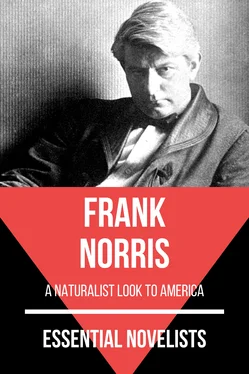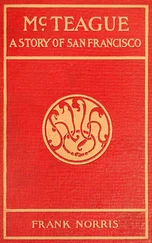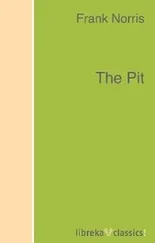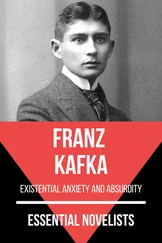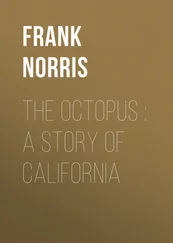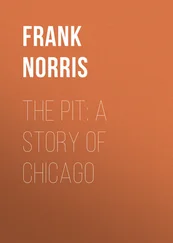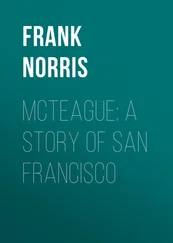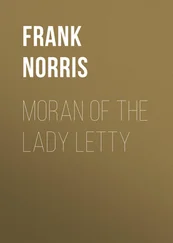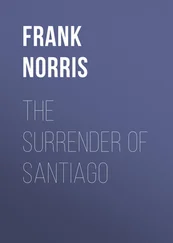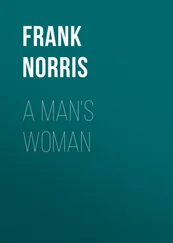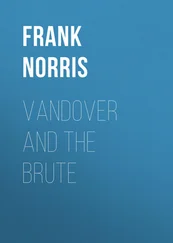But Marcus made the most of his renunciation of his cousin. He remembered his pose from time to time. He made McTeague unhappy and bewildered by wringing his hand, by venting sighs that seemed to tear his heart out, or by giving evidences of an infinite melancholy. “What is my life!” he would exclaim. “What is left for me? Nothing, by damn!” And when McTeague would attempt remonstrance, he would cry: “Never mind, old man. Never mind me. Go, be happy. I forgive you.”
Forgive what? McTeague was all at sea, was harassed with the thought of some shadowy, irreparable injury he had done his friend.
“Oh, don't think of me!” Marcus would exclaim at other times, even when Trina was by. “Don't think of me; I don't count any more. I ain't in it.” Marcus seemed to take great pleasure in contemplating the wreck of his life. There is no doubt he enjoyed himself hugely during these days.
The Sieppes were at first puzzled as well over this change of front.
“Trina has den a new younge man,” cried Mr. Sieppe. “First Schouler, now der doktor, eh? What die tevil, I say!”
Weeks passed, February went, March came in very rainy, putting a stop to all their picnics and Sunday excursions.
One Wednesday afternoon in the second week in March McTeague came over to call on Trina, bringing his concertina with him, as was his custom nowadays. As he got off the train at the station he was surprised to find Trina waiting for him.
“This is the first day it hasn't rained in weeks,” she explained, “an' I thought it would be nice to walk.”
“Sure, sure,” assented McTeague.
B Street station was nothing more than a little shed. There was no ticket office, nothing but a couple of whittled and carven benches. It was built close to the railroad tracks, just across which was the dirty, muddy shore of San Francisco Bay. About a quarter of a mile back from the station was the edge of the town of Oakland. Between the station and the first houses of the town lay immense salt flats, here and there broken by winding streams of black water. They were covered with a growth of wiry grass, strangely discolored in places by enormous stains of orange yellow.
Near the station a bit of fence painted with a cigar advertisement reeled over into the mud, while under its lee lay an abandoned gravel wagon with dished wheels. The station was connected with the town by the extension of B Street, which struck across the flats geometrically straight, a file of tall poles with intervening wires marching along with it. At the station these were headed by an iron electric-light pole that, with its supports and outriggers, looked for all the world like an immense grasshopper on its hind legs.
Across the flats, at the fringe of the town, were the dump heaps, the figures of a few Chinese rag-pickers moving over them. Far to the left the view was shut off by the immense red-brown drum of the gas-works; to the right it was bounded by the chimneys and workshops of an iron foundry.
Across the railroad tracks, to seaward, one saw the long stretch of black mud bank left bare by the tide, which was far out, nearly half a mile. Clouds of sea-gulls were forever rising and settling upon this mud bank; a wrecked and abandoned wharf crawled over it on tottering legs; close in an old sailboat lay canted on her bilge.
But farther on, across the yellow waters of the bay, beyond Goat Island, lay San Francisco, a blue line of hills, rugged with roofs and spires. Far to the westward opened the Golden Gate, a bleak cutting in the sand-hills, through which one caught a glimpse of the open Pacific.
The station at B Street was solitary; no trains passed at this hour; except the distant rag-pickers, not a soul was in sight. The wind blew strong, carrying with it the mingled smell of salt, of tar, of dead seaweed, and of bilge. The sky hung low and brown; at long intervals a few drops of rain fell.
Near the station Trina and McTeague sat on the roadbed of the tracks, at the edge of the mud bank, making the most out of the landscape, enjoying the open air, the salt marshes, and the sight of the distant water. From time to time McTeague played his six mournful airs upon his concertina.
After a while they began walking up and down the tracks, McTeague talking about his profession, Trina listening, very interested and absorbed, trying to understand.
“For pulling the roots of the upper molars we use the cowhorn forceps,” continued the dentist, monotonously. “We get the inside beak over the palatal roots and the cow-horn beak over the buccal roots—that's the roots on the outside, you see. Then we close the forceps, and that breaks right through the alveolus—that's the part of the socket in the jaw, you understand.”
At another moment he told her of his one unsatisfied desire. “Some day I'm going to have a big gilded tooth outside my window for a sign. Those big gold teeth are beautiful, beautiful—only they cost so much, I can't afford one just now.”
“Oh, it's raining,” suddenly exclaimed Trina, holding out her palm. They turned back and reached the station in a drizzle. The afternoon was closing in dark and rainy. The tide was coming back, talking and lapping for miles along the mud bank. Far off across the flats, at the edge of the town, an electric car went by, stringing out a long row of diamond sparks on the overhead wires.
“Say, Miss Trina,” said McTeague, after a while, “what's the good of waiting any longer? Why can't us two get married?”
Trina still shook her head, saying “No” instinctively, in spite of herself.
“Why not?” persisted McTeague. “Don't you like me well enough?”
“Yes.”
“Then why not?”
“Because.”
“Ah, come on,” he said, but Trina still shook her head.
“Ah, come on,” urged McTeague. He could think of nothing else to say, repeating the same phrase over and over again to all her refusals.
“Ah, come on! Ah, come on!”
Suddenly he took her in his enormous arms, crushing down her struggle with his immense strength. Then Trina gave up, all in an instant, turning her head to his. They kissed each other, grossly, full in the mouth.
A roar and a jarring of the earth suddenly grew near and passed them in a reek of steam and hot air. It was the Overland, with its flaming headlight, on its way across the continent.
The passage of the train startled them both. Trina struggled to free herself from McTeague. “Oh, please! please!” she pleaded, on the point of tears. McTeague released her, but in that moment a slight, a barely perceptible, revulsion of feeling had taken place in him. The instant that Trina gave up, the instant she allowed him to kiss her, he thought less of her. She was not so desirable, after all. But this reaction was so faint, so subtle, so intangible, that in another moment he had doubted its occurrence. Yet afterward it returned. Was there not something gone from Trina now? Was he not disappointed in her for doing that very thing for which he had longed? Was Trina the submissive, the compliant, the attainable just the same, just as delicate and adorable as Trina the inaccessible? Perhaps he dimly saw that this must be so, that it belonged to the changeless order of things—the man desiring the woman only for what she withholds; the woman worshipping the man for that which she yields up to him. With each concession gained the man's desire cools; with every surrender made the woman's adoration increases. But why should it be so?
Trina wrenched herself free and drew back from McTeague, her little chin quivering; her face, even to the lobes of her pale ears, flushed scarlet; her narrow blue eyes brimming. Suddenly she put her head between her hands and began to sob.
“Say, say, Miss Trina, listen—listen here, Miss Trina,” cried McTeague, coming forward a step.
Читать дальше
